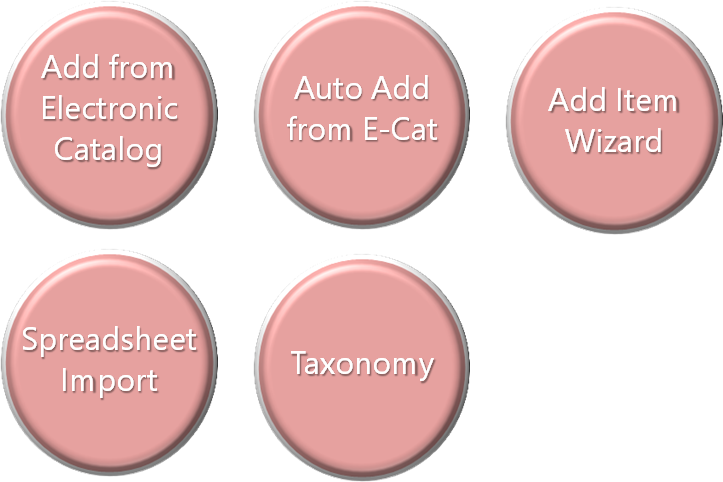1. Adding Inventory
Preface to Adding Inventory.
Central to the design of TransActPOS is the presence of the Electronic Catalog, though not a requirement, the presence of a catalog provides efficiency that far exceeds the learning curve and effort to obtain a list of product from a vendors.
Keys to success:
|
Adding
Establishing the source of inventory: eCatalog
1. Provide a condensed overview of the eCatalog, Vendor, and Inventory relationship
2. A diagram to quickly understand the multiple catalog/vendor relationships will help drive the point home within a five minute presentation of this topic.
-
Vendor Setup - The relationships between the vendors established from the beginning will streamline the Primary versus Secondary environment.
-
Cross Check - matching exact item relationships between vendors
-
Exact Match versus Functional Match - Summary: ACCEPT Exact Matches - AVOID Functional Matches
-
Vendor Swap - Fixing the above relationship issue after adopting new vendors - (Called Vendor Change within the current published Help File - updated to reflect title change)
When an item is added by any of the following methods, what does the inventory item look like?
The “Lookup By” Inventory Tab brings home the relationship between PVPN and SPVNs
Lookup by
-
Which vendor’s price is adopted when the item is added to inventory
-
The initial price is based on the vendor's electronic catalog record used during the add process.
-
Which Vendor’s Cost is adopted when the item is added to inventory
-
The initial cost is based on the vendor's electronic catalog record used during the add process.
-
What vendors are in the lookup listing
-
When an item is added to the inventory, multiple vendor relationships will appear within the Look Up by tab of the I
Question:
-
Who’s cost is used when creating a purchase order?
-
The cost applied to a purchase order falls into the following process:
-
Current replacement cost presented in the electronic catalog which was downloaded during the scheduled communications via IOR for Do it Best and True Value installations
-
Current replacement cost based upon the last time the IOR process was run for communicating vendors that do not have a scheduled event within TranActPOS - Vendors without scheduled communications are Orgill, House-Hasson, United Hardware and Emery Jensen
-
Current replacement cost will be used that is preset within the electronic catalog based upon the last time the vendor’s available inventory spreadsheet was last imported. If the vendor’s spreadsheet was imported two years ago, the cost applied to the purchase order detail line will be two years old.
-
If no electronic catalog is present, the system will use the Last Cost indicated for the indicated vendor within the purchase order.
-
If not prior purchase order receipts are entered, the system will use the current Average Cost.
-
When entering the purchase order the user may always edit the purchase order cost to the they desire to enter…..
-
Purchase order cost is updated upon receipt of the Consolidate Invoice from the vendor or by the user as then review the purchase order receipt when processing a manual receipt of the purchase order.
-
How fresh is the indicated vendor cost found within the electronic catalog?
